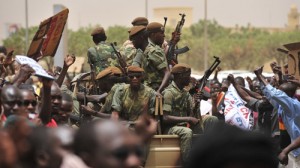
The gruesome and horrific stoning of a man and woman in northern Mali is the latest event to remind the world of the crisis that has engulfed the West African country Mali. Since a military coup overthrew the democratically elected government in March, armed groups have taken control of the north of the country, committing abuses in an attempt to change behavior in accordance with a fundamentalist interpretation of Islam.
In the south of the country, political instability is compounding the abject human rights situation, where soldiers loyal to the Junta (the so-called “Green Berets”) have carried out egregious crimes, especially following an attempted counter-coup on April 30. The ECOWAS-supported transitional government appears to exercise little control in the south, and in a report released yesterday, Amnesty International detailed findings from a 10-day mission documenting likewise horrific crimes and disappearances.
In May, my colleague Christoph Koettl was among those sounding the alarm to the forgotten crisis that was Mali at the time. Three months later, brutal executions such as the couple stoned to death in the North continue to add to the list of grave abuses, including torture, extrajudicial executions, rape and sexual violence, recruitment of child soldiers, and many others that have engulfed the whole of Mali.
They were threatening and pointed their guns at us. We were four, they asked us to undress completely, we were ordered to sodomize each other otherwise they would execute us.
The situation in Mali has become so dire, that even some leaders in the region are forecasting intervention. The climate of fear that has been created in the opposition-controlled North and the crimes committed there under international law demand condemnation, investigation, and accountability. In the South, widespread disappearances, torture, and killing are possible only through the environment of impunity that the authorities have allowed to fester.
At the highest levels of the state, such as it is, authorities must officially and publicly denounce and prohibit these flagrant violations, investigate these crimes, and prosecute without delay where there is sufficient admissible evidence.
The abuses suffered by the people of Mali and the lack of accountability has gotten too little attention to date — and we must now urgently pay attention to the consequences that have followed from that neglect.
